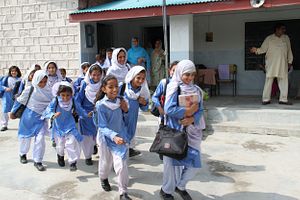Amid the pandemic, 16-year-old Deepa misses going to school, being with her friends, having fun and learning from her teachers. As a student in rural Nepal, however, she is fortunate that her parents support her education and that she can use her mother’s mobile phone to attend Zoom classes.
In this crisis, not every young woman is so lucky. Twenty percent of girls in East Asia and the Pacific, close to 40 million of them in total, have not been able to access distance learning during COVID-19 and 69 percent of girls reported studying and learning less than usual, according to UNICEF.
Women and girls are particularly vulnerable to the negative impacts of education disruption caused by school closures. In South and West Asia, 2.8 million women and girls may not be able to return to education, from pre-primary to tertiary levels.
Girls deprived of education will suffer long-term consequences for their welfare and agency. That affects us all, as we know from available evidence that girls’ education can bring economic prosperity, more just societies and benefits for everyone. For instance, recent studies by the World Bank show that the benefits of a girl having a secondary education lie not only in her having access to work and higher incomes, but also in the elimination of child marriage and reduction of child mortality and malnutrition. Her education really is our future.
The economic and social pressures caused by COVID-19 have placed a disproportionate burden of family and childcare on women and girls. In Asia and the Pacific, 67 percent of parents have reported increases in their daughters’ domestic work, compared to 57 percent for their sons, according to U.N. Women and Women Count. The increased workload affects available study time and access to remote learning opportunities, even where these are available.
Being out of school is not just about interrupted learning. Schools provide nutrition through school meals, without which learners are more food insecure. Access to essential health information, such as through comprehensive sexuality education, are also negatively affected by extended school closures.
The broader negative consequences for society do not end there. Increasing rates of gender-based violence are linked to lockdowns, loss of income and the loss of protection offered by schools. According to UNFPA, for every three months that lockdowns continue, 15 million more global cases of gender-based violence are expected.
For girls who are spending more time online, the risks of cyber-bullying and sexual exploitation have also risen. The Philippines recorded almost 280,000 cases of online sexual abuse against children from March 1 to May 24 of this year, four times more than for the whole of 2019. Furthermore, tens of thousands of girls in Asia have been subjected to early and forced marriage since the beginning of the pandemic, according to UNICEF. In Indonesia alone, 33,000 child marriages were permitted in the first six months of 2020, doubling the 2019 rate.
Despite the precarious situation, the pandemic also offers the opportunity to “build back equal,” by realizing commitments to gender equality in and through education. To do so, girls must be placed at the center of national education recovery plans, with equal access to distance learning and equitable opportunities to build digital skills. This is not a job for the education sector alone. Working across sectors, governments and partners need to assess and address the needs of all girls for returning to school, and prioritize their safety and protection.
There are already encouraging efforts taking place across the region. During the initial closures, Indonesia set up learning from home guidelines that included online learning, television and print materials. A three-month radio advocacy campaign in Nepal, “Keeping girls in the picture,” is broadcast weekly by 26 community radio stations, using radio dramas and interviews to draw attention to harmful practices that perpetuate gender-based discrimination, inequalities in education and what can be done to address these problems.
To prepare students to return to school in Pakistan, national education partners including district education departments, parents, teachers and religious and community leaders, have launched a campaign targeting the most remote and isolated districts. Partners are working to ensure young women and girls can return to school, taking steps such as improving water, sanitation and hygiene facilities at schools so that girls’ monthly management of their menstruation does not cause them to miss out on learning.
Tangible measures such as these – actions not only in schools and communities but also at the broader policy level – are promoted in “Building back equal: girls back to school guide,” developed by partners in UNESCO’s COVID-19 Global Education Coalition’s Gender Flagship. The guide, in addition to other practical tools and the stories of young women told in their own words, form part of the global #LearningNeverStops campaign.
Advocacy, technical support and partnerships are essential to keeping young women and girls at the center of pandemic recovery efforts, which means ensuring their continued education so that every girl can fulfill her lifetime of potential. For Deepa and so many other girls, we have to transform this crisis into an opportunity to build back equal.
Jenelle Babb is Regional Advisor on Education for Health and Wellbeing at UNESCO Asia and the Pacific Regional Bureau for Education.
Natalie Buchanan is a UNESCO Bangkok Volunteer and master’s student in Globalization and International Development Specialization in Feminist and Gender Studies at the University of Ottawa.

































